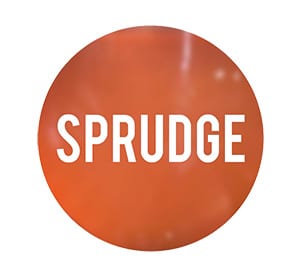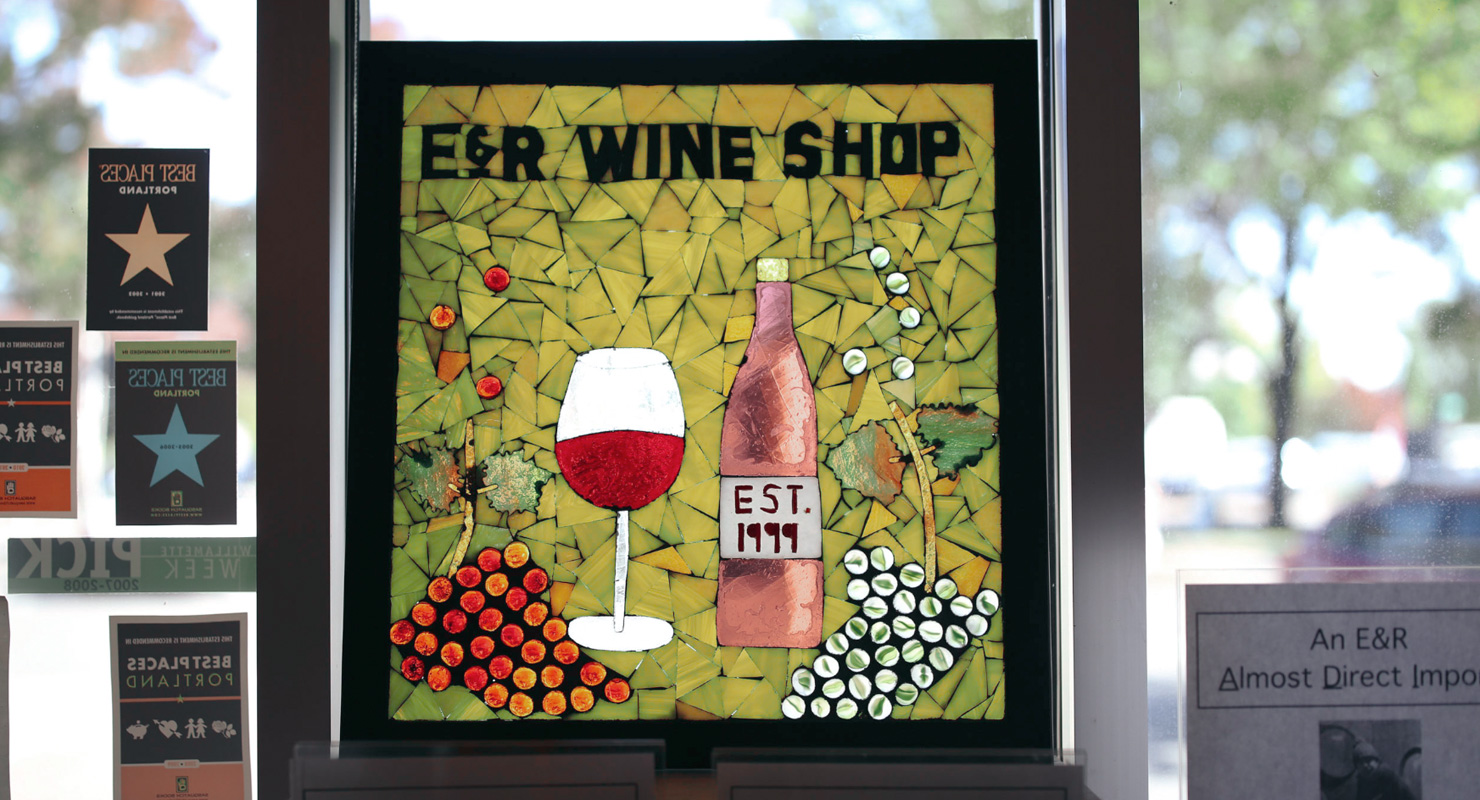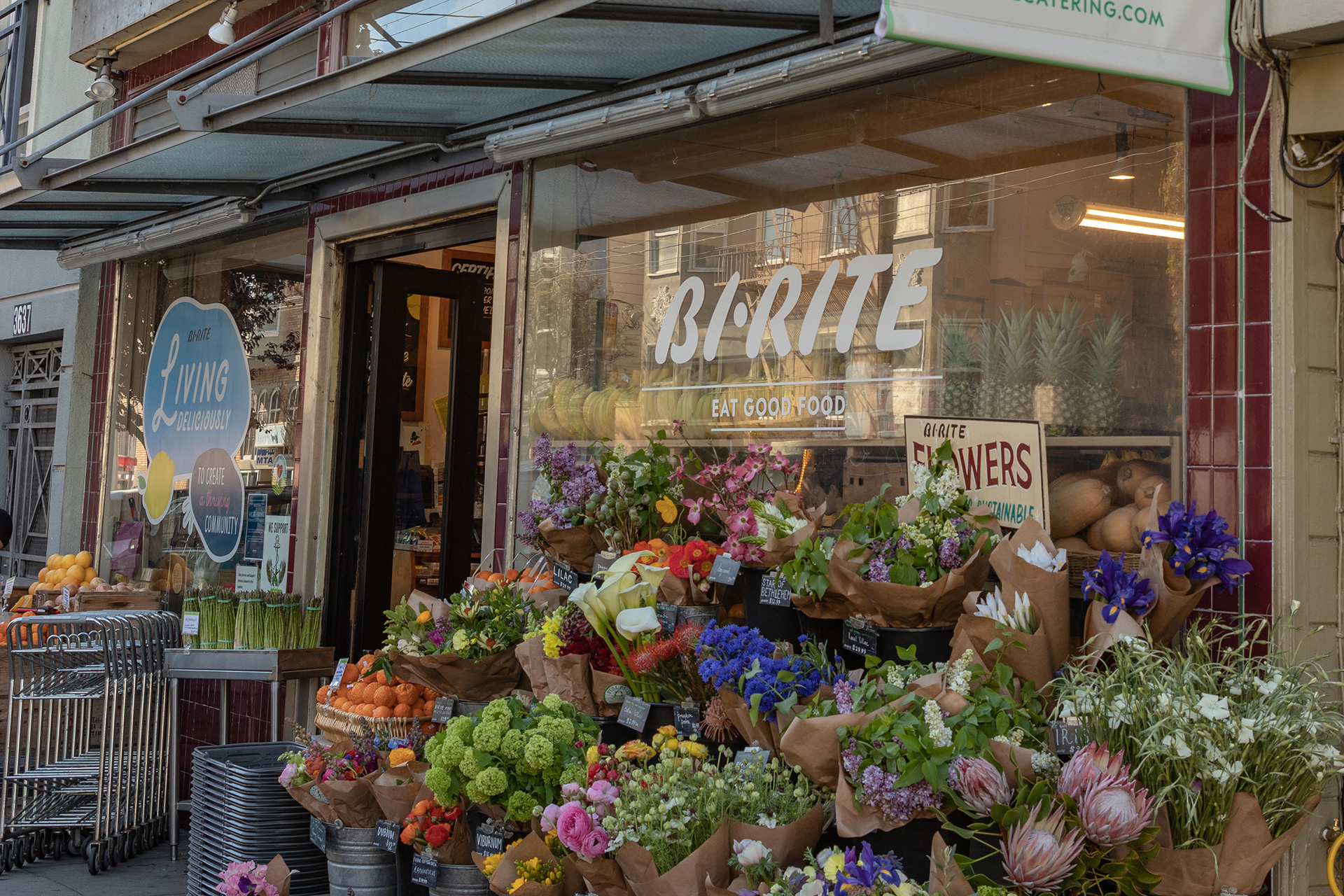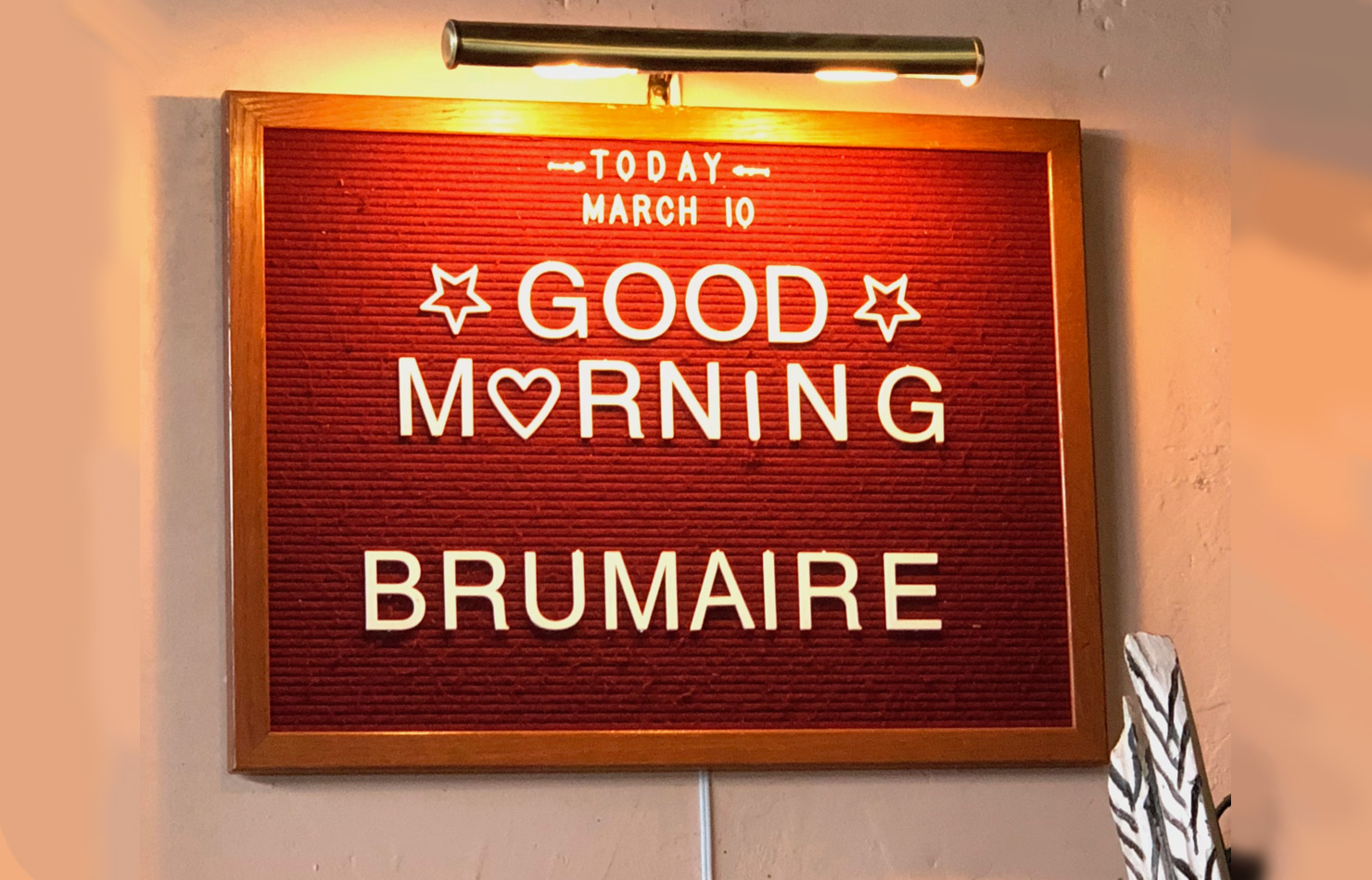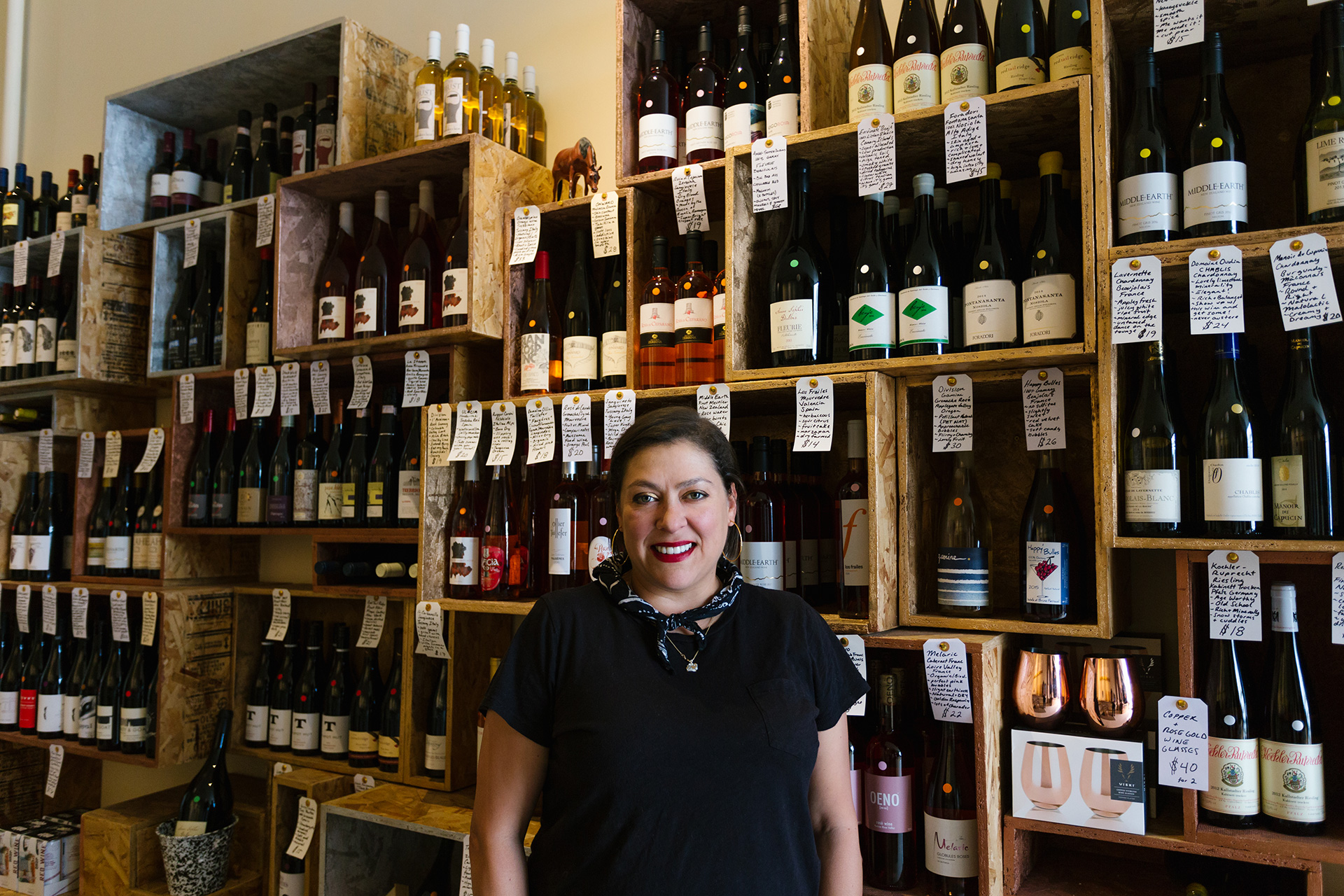
“I’ve always done whatever the hell I wanted to do!” This is something Coly Den Haan, proprietor of Vinovore in Los Angeles’ Virgil Village, admits easily. So in September, the wine and dining world veteran pivoted her entrepreneurial energy (previously poured into her spots Perch and The Must) into building out her ideal wine shop. She decided that to stand out in a town indulged with a lot of good wine, its trademark was to stock exclusively female winemakers. Then, she was going to un-stuff and demystify wine shopping for anyone who walked in the door, no matter their exposure or experience.
Large on the wall is a cheeky, nuanced wine palate chart Den Haan designed to help customers navigate the stock. It asks, “What Kind of Vinovore Are You?” and presents you with nine different Zodiac-style personality types based on your mood, your palate, and your wine go-to’s. The Purple Ape could be you if you crave jammy, juicy, ready-to-drink reds, or Orange Tiger, for nouveau and skin-fermented orange nerds. Corresponding colored stickers on each bottle in the shop will demarcate what’s for who, so you don’t need to be an expert on, say, Italian varietals, to know which Italian bottle to spring for.
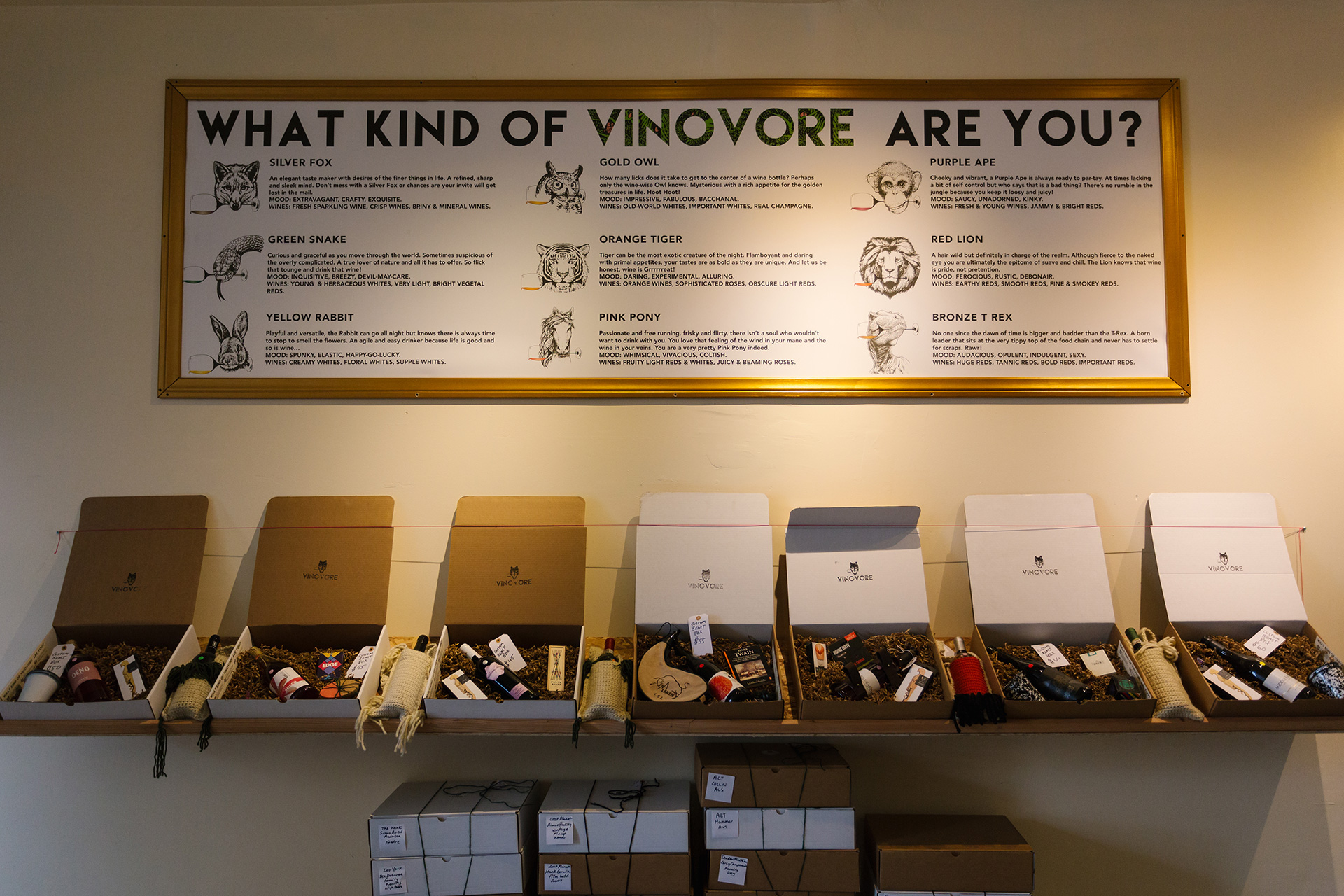
Throughout the shop, a contemporary wine should be fun ethos glimmers through the details. Beyond offbeat touches—hand-written descriptions for each bottle are posted up with notes such as, “show up with this wine and get some!” for Domaine Oudin Chablis Chardonnay, or “won’t you take me to Funky Town” for Donkey + Goat’s Pinot Gris Romato—the tone of Vinovore is reverent towards its wine, but irreverent towards the old-school wine shop intimidation factor.
No matter the Vinovore identity, the tastes of #rosévibes, brunchgals, and wild yeast geeks alike have been considered in equal measure, no pretense. That makes it a great ground zero for curious natural wine newbies looking to learn their palate, or any drinker craving exploration within a certain profile. At the very least, Vinovore does the good work of bringing women winemakers to the front, so drinkers can easily pay their due respects with their dollars to women making great wine from all over. Sprudge stopped in to Vinovore to talk to Den Haan about the animal archetypes, women in wine, and being natural by default (versus dogma).
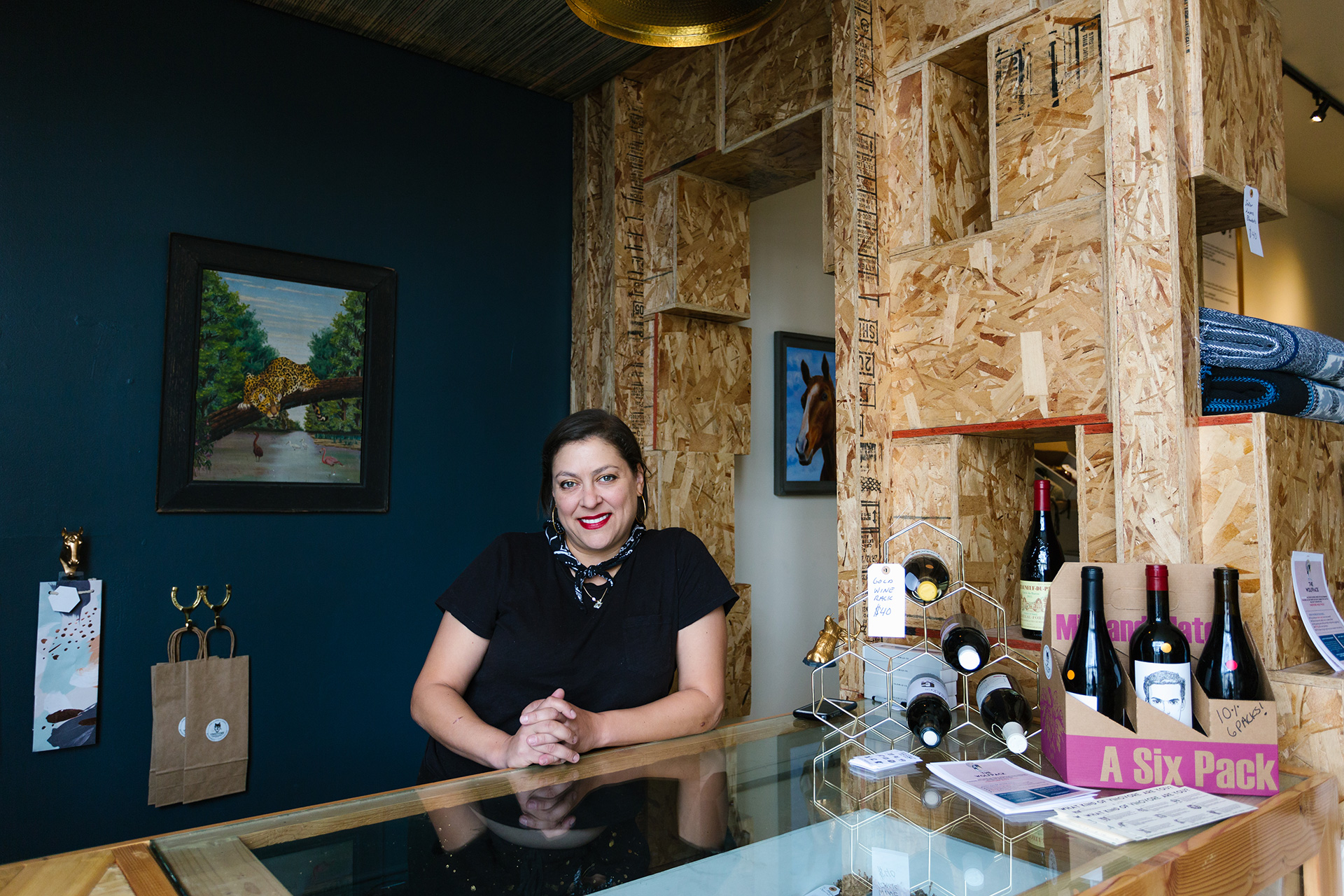
Sprudge: About how you developed your archetypes: Did you have a set number in mind? Did you start listing out different tasting preferences? How did the process go?
Den Han: I did not have a set number in mind, and it had many incarnations before I got it to exactly where I wanted it to be. There was an extra one on there we’re going to bring back as a special—unlock the Blue Bear!
What’s the Blue Bear?
Dessert wines, sherries, things like that.
My main goal was to create something that was different to the wine shopping experience than what I’ve seen before, and how was I going to break that down. It’s fairly generalized between the nine different categories. There are sub categories within the categories, but I also didn’t want it to be overwhelming. That was the opposite of the whole idea of it—it’s supposed to be very approachable, very understandable, where the wine could be really unique and different, but maybe if you were a newbie, this would allow you to try something new without being intimidated in any way. I wanted the chart to be very approachable; to be cute and clever. The idea originally formed as a Chinese zodiac or an astrology—what kind of Vinovore are you? That’s how it all started, the animals with the Vinovore/Carnivore theme was kind of the deal.
Do you tend to have a favorite to shop for?
Yes. There are some people who come in who are like, “I am a Bronze T-Rex, all of the time.” And then there are some who come in and are like, “oh, I’m three things, or I’m in the mood for this,” so I’m on that line. There’s definitely the seasons, what I’m eating, what I’m in the mood for, but I mainly resonate towards Orange Tiger—so I love the orange wines, obscure rosés, more sophisticated rosés, lighter, chillable reds. That’s been my frame of mind the past couple of months. Before that I thought I was definitely a Gold Owl. But now I’m an Orange Tiger! Spring will come, and maybe I’ll be a Pink Pony.
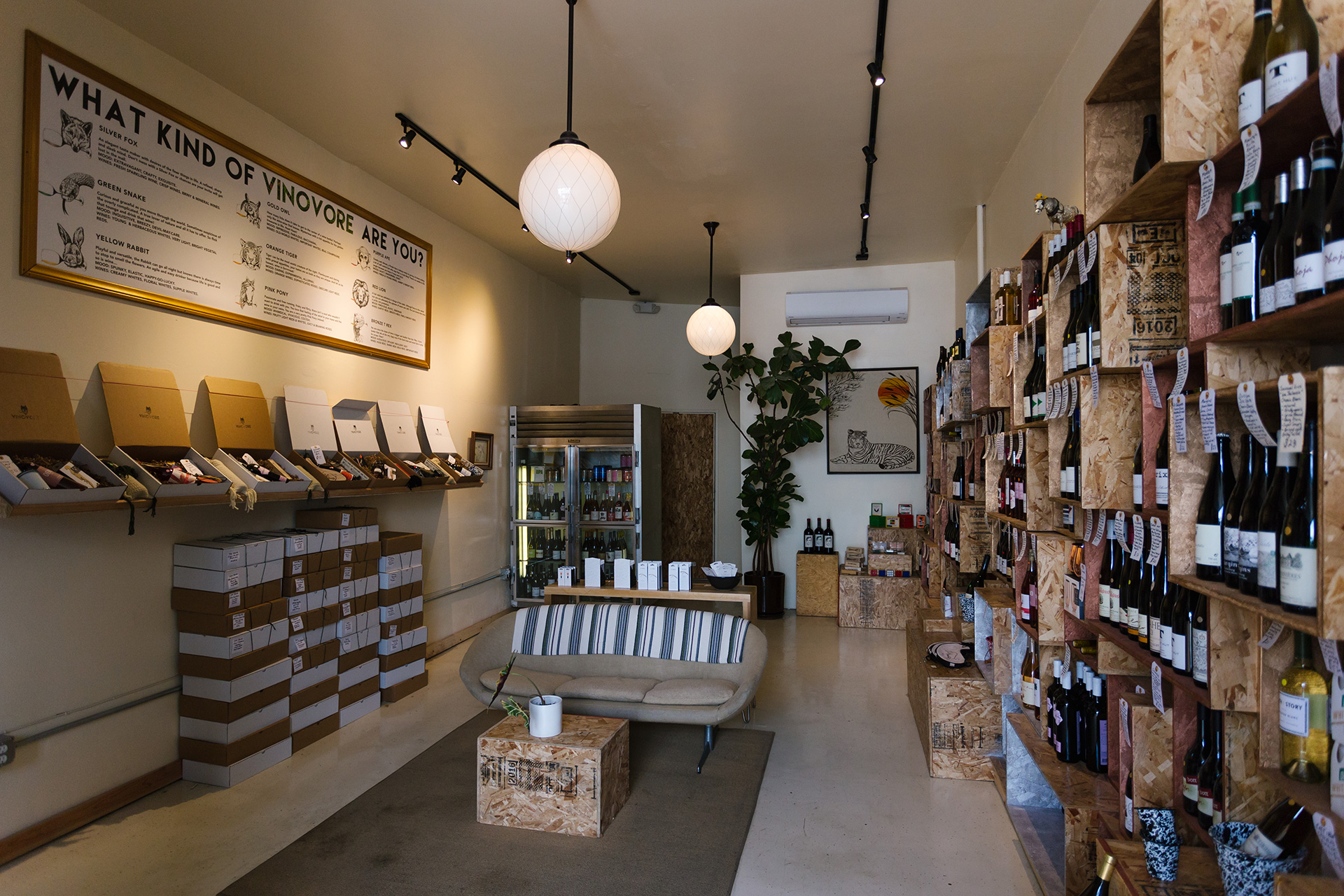
Do you find there to be a popular choice between people who come in?
People are fairly across the board, I would say. Pink Pony is one of the more popular ones, Red Lion, Bronze T Rex, those are really popular, and the wine geeky people are definitely Silver Foxes, Orange Tiger, Green Snake. So it just depends on the clientele. People who are just ready to drink: Purple Ape, Pink Pony, but you know, there’s also people who don’t know a lot about wine and didn’t now how to identify themselves, and once they read, “oh, I love mineraly wines, I didn’t know I love mineraly wines,” then they know they’re a Green Snake. So now they can easily find those mineraly wines without having to read every single description, or know automatically that a certain grape or region is going to be mineraly.
I’m curious—there’s a lot you’ve already said in interviews about the female focus, which is exciting and relevant, and people I think are willing to shop this way. It seems to me like many entry points to winemaking is generational or familial. Is that the same when you’re encountering female winemakers? Do you find a lot of your producers come form wine families, or are there these renegade women who have no connection to wine, fall in love, and find a way to make their own stuff?
I would say it’s fairly split, and it seems to be split by area, geographically. With a lot of the Old World wines, and I’ve said this before, I’ve seen a through line, and I didn’t really put two and two together before doing this. But France, Italy, Spain…these chateaus and vineyards have been in the families forever, but the difference is, instead of it always going to the sons or the husbands of the wives, or the brothers, now the women, the daughters, the sisters, the wives, are showing a lot more interest, and are going to school. They’re learning the craft, they’re being allowed to take over these chateaus and vineyards, which I thought was really great, since Old World wines can be very old school, very traditional.
That’s one category of female winemakers that I see a lot of. More domestically speaking, California, Oregon, even New York and Washington, it’s more the renegade females who are wanting to get dirty. They’re choosing it as a profession. They’re going to school, they’re not these little rich kids who are getting handed these vineyards. They’re working in other people’s vineyards so they can go off on and make their own wines. A lot of times its trade. They’ll make next to minimum wage at these bigger houses in order to use their facilities to make their projects. They’ll be buying grapes and making them there and just going for it, building their name that way, and then they’ll grow and grow and grow. So, that’s the two categories of female winemakers I’ve been seeing.
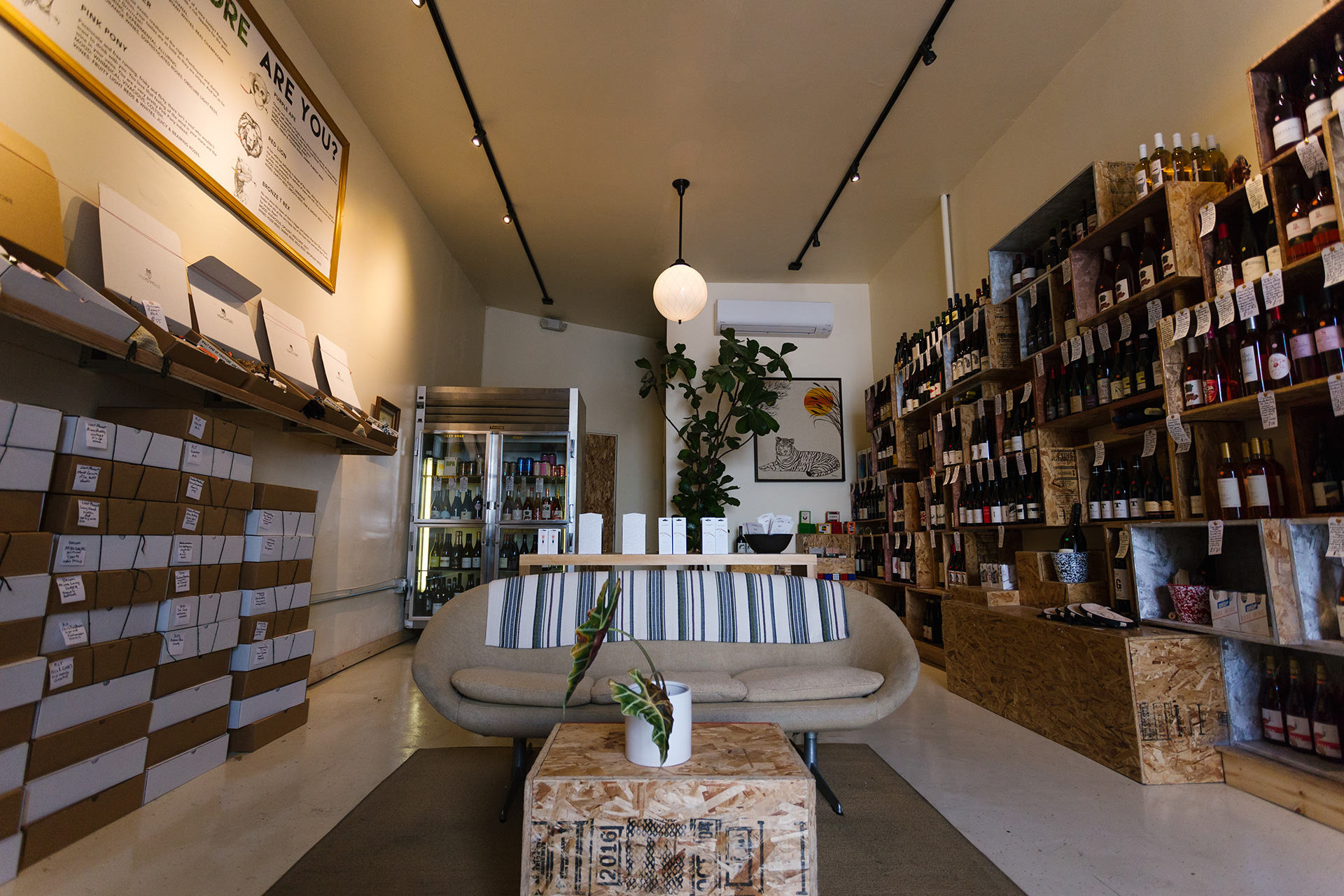
Has anything different arisen for you from buying from women producers versus the other wine buying you’ve done in the past? Has it been more fun?
It’s definitely a lot of fun! It’s been really interesting, especially the reactions of the people that I buy wine from. The ones that know me, who are really excited when I told them the concept, the ones who don’t are excited to show me new things.
The challenges have been that there are certain regions I’m used to carrying that’s been hard to find female winemakers from. Throughout the years, being a somm, and buying for restaurants, I’ve always had a strong global focus. I’ve always loved obscure regions—the weirder the better. This is a little harder for me to pull that Republic of Georgia female winemaker, or that Israeli female winemaker. That’s been a little more challenging, and in that respect I see other wine regions that have a lot of female winemakers that I never thought would, like New Zealand.
I can’t carry (right now) all the wines I want from all the different regions. That’s not saying they’re not out there. Sometimes they are out there and I can find them online but they don’t actually distribute here, so that’s a little difficult for me. Sometimes the same goes for a certain varietal, and there’s amazing wine being made by men, and I’ve tasted in the past or in passing that I love, and being true to what I’m doing, I’m not going to bring it in. So that’s a little tough for me, but not super tough. (laughs) Other people are buying their wines, though, so they’re doing fine!
Obviously you have an extensive Rolodex in your head about wines you to want to buy, but how do you seek out female producers of wine?
There’s definitely through the travels female winemakers I’ve met and carried in previous establishments, and loved their wine, and that was called upon right away. I’m lucky to work with a really amazing group of distributers here in Los Angeles. We’re lucky to be able to have access to a lot of great wines—there are a lot of great books in LA. Having those relationships and telling them what I wanted, I let them do some of the legwork for me, and they comb through their book sand bring me all of their female winemakers.
We’ve all been really excited, because that’s not a question that’s really been asked of them before. Especially my female reps are like, “yeah, awesome! I have this woman, and this woman…” Or sometimes they’re like, “I didn’t even realize I had this wine, because now I’m just looking for female winemakers,” so it might just be buried in this book, a wine they never go out with, never show to anybody, because they often have hundreds or thousands of wines that they represent. They’re discovering wines in their own book that they wouldn’t necessarily pull out. That’s been fun.
On the flip side, other people that come here as patrons are telling me their favorite female winemaker, like Sonya [Magdevski] from Casa Dumetz. After I opened, those first couple of weeks, people came in asking, “do you have Casa Dumetz?” And I’m like, “no, but I guess I should get her!” That wouldn’t have been something I would have sought out, but there are customers who remember specifically, especially women, the female winemakers they’ve met along the way, because it is more of a rarity, and they want to share that information with me. If I can get it, I do.
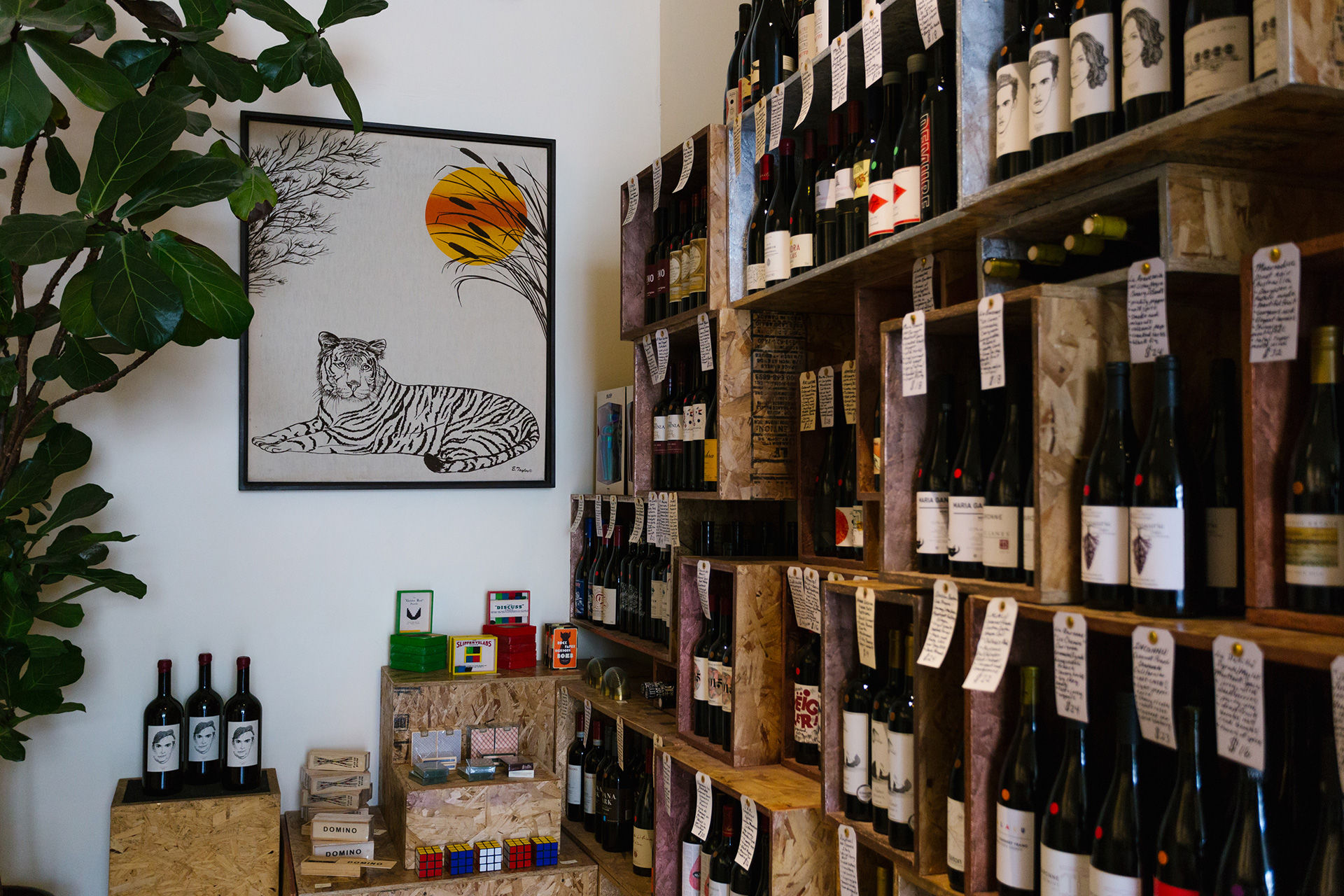
Do you consider yourself a natural wine shop? Do you have a personal definition of it that guides your buying?
I don’t classify us as natural wine shop, though I would say we are majority natural wine. The movement’s been happening for a while, and what I used to tell people at previous restaurants is that sometimes natural, organic, biodynamic, especially with the older style wines—a lot of them don’t want to deal with the classifications. It’s big hassle. There are so many laws. But they’re not putting pesticides in it. Natural winemaking is the old way of making wine, you know? A lot of these people have been doing natural wine but I’ve been buying wine from them for years.
For me, one of my most passionate things about the wine process is varietals. I really like tasting the grape, the expression of the terroir, the ground its coming from. Not to go back to the female winemaker thing, but that’s kind of one of the differences in female-made wines; there tends to be a little less hands on, and a little bit more letting the grape be the grape, letting the wine be the wine. Also, I’ve noticed that a lot of these women in France, Italy, and Spain taking over these houses, one of the very first things they do is switch to natural, biodynamic, and organic. It’s something that’s very close to women I’ve found that they are using natural winemaking practices.
I love natural wine [and so], semi by default, we are kind of a natural wine shop. That isn’t the main focus. Nobody wants added sulfur to their wines, of course not, but it’s getting a little out of hand with some of the wines. I’ll just taste them like, okay, this is bad! This is mousey! You can’t sell me this, I’m not falling for it! (Laughs) There’s plenty of good natural wines.
What bugs you about the wine world today? What do you get to avoid or take into your own hands and shape by yourself from being an entrepreneur in the LA wine world your whole life?
Things have really changed a lot. I had a lot more things that bothered me when I first started, which spurred on the way I’ve shaped my career. The female winemaker thing obviously is a thing that I feel like I’m doing to support a smaller category with in my industry. There are a lot more people women wine. It is a lot more common to see female sommeliers and wine buyers than it was 10 years, even five years ago. It’s nice to be a part of that movement.
Let people know that this is still a male dominated industry, because for a lot of people that come in here, there’s either one reaction: “These are ALL made by women?” Or, “I didn’t even know that was a thing, that women weren’t making wine, but now that you say that,”… It’s kind of a conversation piece, getting it out there that this is an issue. Being in LA and dealing with all of the Hollywood drama right now, politics…it’s all interconnected.
At the end of the day, women are the number one consumers of wine, the number one purchasers both retail and in restaurants. I don’t know why it’s alway been geared towards men—just the wine shops and the restaurants, and the wine list was always, like, handed to the man—it’s always been that way, and I definitely had the same perception of the wine world when I started, that wine’s for old, white, rich, stuffy dudes. I think that’s an interesting way that the industry is changing, and I hope I’m a small part of that. It’s naturally changing on its own.
LA is a very exciting wine scene. People do appreciate wine. They are savvy. Even people who don’t know that much, know a little bit, and are wanting to learn. The tastings are really popular, and people want to be educated. I think those are really positive things that are happening in LA. I can’t say there’s too much negative stuff I want to go out there and change besides the obvious.
Photos by Nick Rufo for Sprudge Wine.
